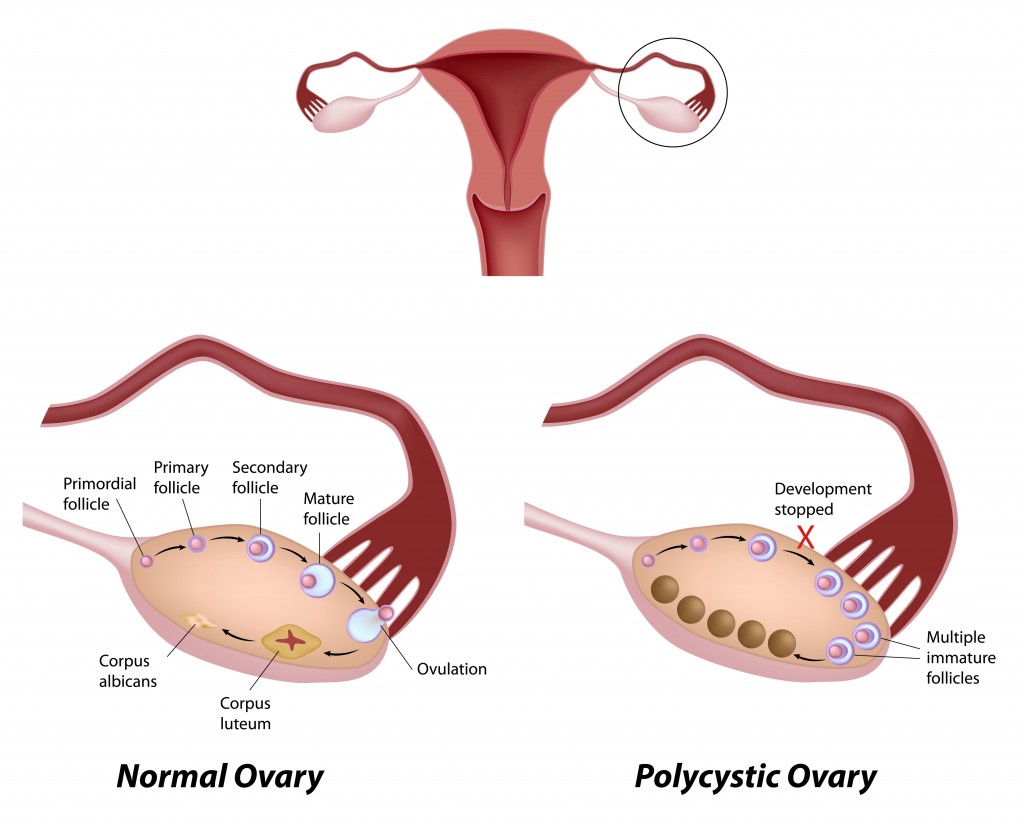Polycystic Ovarian Syndrome (PCOS) is an endocrine disorder affecting nearly 6-8% of women within reproductive age. A recent study conducted by Sorensen et. al. evaluated the effects that a high protein (HP) diet compared to a high carbohydrate (HC) diet may have on overweight women suffering from PCOS. Past studies concerning PCOS and HP diets have included energy restriction with a primary focus being weight loss. The current study was unique in that it evaluated the effect of HP and HC diets irrespective of energy restriction and primarily looked at their effects on total and free testosterone. Secondary to testosterone, the study looked at glucose metabolism, lipid profile, and weight loss. Although the study is unique, there is a good body of research that supports their findings. 1
The study was a parallel group controlled trial that lasted 6 months. Participants were required to have a diagnosis of PCOS and a free testosterone level greater than 0.034 nmol/L. After a significant dropout rate, a total of 14 HP and 13 HC diet participants went to completion. The HP diet consisted of >40% of protein, 30% of fat, and >30% of carbohydrates per daily energy intake. The HC diet consisted of <15% of protein, 30% of fat, and >55% of carbohydrates per daily energy intake. Diet compliance was determined via food diaries and 24 hour urine collection.
Both diet groups experienced a loss in weight and fat mass, however the HP diet experienced an average of loss of 4.4 kg more weight and a loss of 4.3 kg more body fat. Additionally, a lower glucose and C-peptide concentration was seen in the HP diet. However the focus of the study, testosterone, saw no significant changes in either diet after the 6 month intervention.
With only a total of 27 participants finishing the study to completion, additional studies are needed to determine true cause and effect. Since the study’s main focus was to reduce testosterone levels via a HP diet, menstrual cycles should have been taken into account as well. Care was taken as to verify diet adherence when the participants were seen, but adherence was only measured every three months and urine samples only verified the past 24 hours recalled. Since the participation rate was low, additional studies should be done to determine the effectiveness of these diets specifically in PCOS women.
There is a current body of research that both supports and competes with some of the findings in this study. Within this body of research there are many studies demonstrating the effect of a HP diet combined with energy restriction such as that done by Moran et al. Interestingly, Moran saw no significant difference in mean weight loss between a HP and HC diet. However, Moran did see a decrease in testosterone in both diets during energy restriction. 2
In contrast, research conducted by Mavropaulos et al. had no restrictions on energy and extremely low carbohydrate intake. Mavropaulos’ study still saw significant decreases in free testosterone. This finding is consistent with the current study although in an opposing way. Sorensen saw significant increases of free testosterone in HC diet participants. 3
Similar studies suggest the important role that a HP diet may play in women specifically suffering with PCOS. As opposed to the overweight PCOS women in this study who saw decreases in fasting glucose after a HP diet, overweight women with no signs of PCOS who were put on a 10 week HP diet saw no change in fasting glucose. 4
In addition to its potential ability to decrease fasting glucose, a recent study by Larson et al. found that an increase in protein helped maintain weight loss. Protein’s ability to satiate naturally reduces the intake of energy. This is helpful when considering the need for energy restriction. 5
Although the current study found no significant correlation between diet and testosterone, it did see benefits in weight loss, blood glucose, and body fat loss among others. These findings are in agreement with similar studies. This suggests that overall, a HP diet consisting of >40% of daily energy coming from protein, to be potentially beneficial to those overweight women suffering from PCOS. At the end of the day, the question is: will a HP diet or calorie deficit make a difference? The answer depends on the desired outcome. But if you’re looking for lower testosterone levels and better blood sugar management, I think the answer is both.
If you specifically want less testosterone – the magic is in energy restriction, not diet type per se.
References:
- Sorensen LB, Soe M, Halkier KH, et al. Effects of increased dietary protein-to-carbohydrate ratios in women with polycystic ovary syndrome. Am J Clin Nutr. 2012. 95: 39-48.
- Moran LJ, Noakes M, Clifton PM, et al. Dietary composition in restoring reproductive and metabolic physiology in overweight women with polycystic ovary syndrome. J Clin Endocrinol Metab. 2003. 88: 812-9.
- Mavropoulos JC, Yancy WS, Hepburn J, et al. The effects of a low-carbohydrate, ketogenic diet on the polycystic ovary syndrome: a pilot study. Nutr Metab (Lond). 2005. 2:35.
- Layman DK, Shiue H, Sather C, et al. Increased dietary protein modifies glucose and insulin homeostasis in adult women during weight loss. J Nutr. 2003. 133: 405-10.
- Larsen TM, Dalskoy SM, van Baak M, et al. Diets with high or low protein content and glycemic index for weight-loss maintenance. N Engl J Med. 2010. 363: 2102-13.
Reviewed by Viktoriya Wolff







